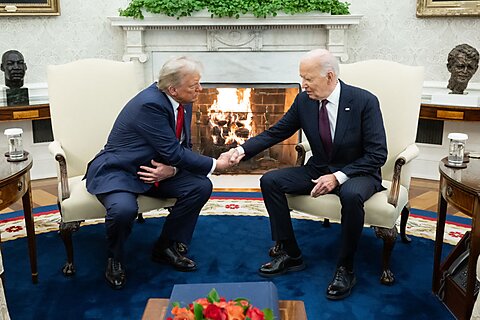Clark Neily
“I have a theory: Qualified immunity has already been bitten by one of the walkers in the Walking Dead, and it’s in the zombification process.”
So said David French on last week’s episode of The Dispatch’s Advisory Opinions podcast while discussing a recent Fifth Circuit decision denying qualified immunity to a pair of Houston police officers in an utterly bizarre false‐arrest case. Though he doesn’t elaborate, the idea seems to be that qualified immunity’s vital essence has been drained over the years, leaving the dead‐on‐its‐feet doctrine to stagger around menacing victims of government misconduct and searching for brains to eat.
It’s a whimsical image, and I hope David’s right. But here’s an even simpler take: judicial enthusiasm for qualified immunity is starting to wain because not only is it a legal, practical, and moral failure that flies in the face of bedrock conservative convictions about limited government and personal responsibility, it’s an embarrassment to boot—as this latest Fifth Circuit case vividly illustrates. Here are the facts in a nutshell.
The plaintiff, whom we’ll call GS for “Good Samaritan,” is an Uber driver and former police officer who sees a pickup truck careening across I‑610 in Houston in the wee hours of the morning, and suspects, correctly, that the driver is stinking drunk. Worried the other motorist might kill someone, GS calls 911, manages to get the truck stopped and performs a lawful citizen’s arrest when the driver tries to flee on foot across the highway. Two officers arrive at the scene and conduct separate interviews of GS and DD (“Drunk Driver”), while also administering a field sobriety test to DD, which he fails spectacularly.
The two officers then release both men, allowing the obviously intoxicated DD to drive home in his pickup truck. Two days later, the officers, Michael Garcia and Joshua Few, swear out a thoroughly rotten probable‐cause affidavit in which they credit DD’s incoherent and contradiction‐riddled story that GS impersonated a police officer during the encounter on the highway. Warrant in hand, they then go to GS’s house at 3 a.m., wake him up with a ruse, and arrest him for felony impersonation of a police officer—for which he is duly charged and prosecuted until the charges are quietly dropped a few months later.
GS sues a passel of defendants, including officers Garcia and Few, who promptly—and predictably (“How are we supposed to know you can’t make bogus arrests based on fraudulent warrant applications?”) assert qualified immunity. The district court rejects that defense, and, in a surprise twist, the Fifth Circuit (which is hands down the most QI‐friendly court in the country) not only affirms the denial of qualified immunity but does so with an uncharacteristic tone of dismay and disdain for the officers’ unseemly attempt to avoid accountability for their blatant misconduct.
Indeed, the panel begins the opinion with a snarky parenthetical, noting that it affirms the district court’s denial of qualified immunity “(Obviously”), and concludes with a scathing critique of the officers and their counsel that is honestly a bit difficult to process for anyone familiar with the Fifth Circuit’s work in this area:
It is unclear which part of this case is more amazing: (1) That officers refused to charge a severely intoxicated driver and instead brought felony charges against the Good Samaritan who intervened to protect Houstonians; or (2) that the City of Houston continues to defend its officers’ conduct. Either way, the officers’ qualified immunity is denied, and the district court’s decision is AFFIRMED.
As noted, the panel’s indignant tone is striking, particularly in light of the extraordinary largesse routinely shown to members of law enforcement by the Fifth Circuit, including granting qualified immunity to cops who deliberately tased a gasoline‐soaked man, burning him to death in front of his wife and son, and to guards who kept a prisoner in a frigid open sewer of a prison cell for nearly a week. (Notably, the grant of qualified immunity in the latter case was so egregious that the Supreme Court reversed the Fifth Circuit without briefing or argument. Cato filed its famous cross‐ideological amicus brief in support of that result.)
Where on earth could officers Garcia and Few and their lawyers have gotten the idea that even patently absurd assertions of qualified immunity in defense of breathtakingly unprofessional behavior by law enforcement might find receptive ears on the Fifth Circuit? It boggles the mind. (Not.)
So. What if anything does the Fifth Circuit’s remarkable volte‐face in this recent case tell us about the status of qualified immunity: Has it really joined the ranks of the walking dead, “[like] some ghoul in a late‐night horror movie”?
Unfortunately not. Despite constantly mounting evidence of qualified immunity’s utter jurisprudential illegitimacy—including recent scholarship that indicates the as‐enacted (but subsequently bowdlerized) text of § 1983 explicitly rejected background immunity doctrines of any kind—and a growing chorus of academic and judicial critics, qualified immunity continues to fulfill its mission of letting rights‐violating government officials off the hook for their misconduct and ensuring they never have to justify themselves to a jury of their fellow citizens.
But here’s the thing: Even though qualified immunity hasn’t been formally overruled or dialed back, one gets the distinct impression that it has fallen into disfavor among its berobed friends—that it has come to resemble not a zombie so much as the drunken guest at a party whose initially amusing antics are now causing the hosts to blush and wish they had never invited him to the party. If so, that would be progress. And if judges of the Fifth Circuit and other courts express contempt for government lawyers whose unseemly requests for qualified immunity underscore what a garbage policy it has always been—well, that too is progress.
Congress or the Supreme Court should formally rid us of this unjust, unlawful, and immoral doctrine. (Obviously.) And the more well‐deserved scorn we heap upon it now, the sooner that day may come. (Hint, hint.)
























